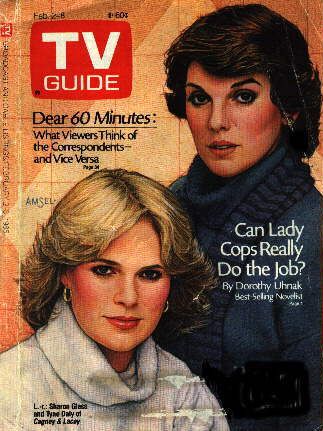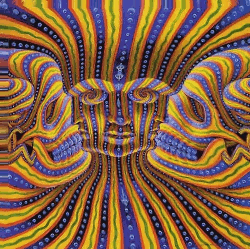From a thread not about TV cops:
DrVolin wrote:This is consistent with something I've highlighted here before: the shift in TV police dramas from procedurals that emphasize due process (trust us, do what we say, we protect your freedom), to the near science fiction of forensics-based detection (don't bother hiding, we'll find you, we have the technology). The death of secrecy cuts both ways, especially if the oligarchs manage to convince you that secrecy is dead while failing to convince themselves. In the same way that the medieval Bishop who didn't fear God had a signficant advantage over his terrified flock.
Expanding on my response from that thread:
These are without a doubt two of the recent stages in the development of TV network cops.
I've devoted more thought than I should to how the TV cop show has developed over the decades. Few genres are more ready to deliver urgent moral messages with no irony intended. Perhaps no other genre is as evocative of the State and the meaning of citizenship, tied to the politics of each successive era, or as explicitly propagandistic. The propaganda function goes as far as tracking and anticipating the latest trends in repressive law enforcement and providing advance justification or normalization (see the 1970s show: SWAT).
Thinking about it is generally more interesting than watching the shows, which often glorify sociopathy (if in the service of authoritarianism) and denigrate empathy. Most are rigidly formulaic: 99 out of 100 cases are either wrapped up by the end of the hour, or else, if a series features multiple subplots running over several episodes, before the end of the “story arc” or season. Even when shows depict a world in which underclass street crime has all society under siege, I doubt more than 1 in 100 perpetrators get away. Depending on the series, the wrong person is either never or rarely imprisoned for more than a few scenes. Cops don't hit or torture people in interrogations, or when they do, it is almost always justified.
I long ago brainstormed a main line of development that tries to capture the predominant tropes, ratings success, critical success, and artistic cross-influences. Each of these measures should be considered as separate from the others; a ratings flop might have a disproportionate influence on subsequent development.
I’m not saying that everything can be reduced to a single progression. (See the very very long list of Anglosphere shows at http://en.wikipedia.org/wiki/List_of_po ... ion_dramas). Rather, I’m shooting for an outline based on the usual concerns of art history: Which works and trends had the most influence on later works? Which were most typical of a period, which were innovative? Where do we see one evolving into the next? What are the ideal or classic types?
Thus, here are the proposed stages, keeping in mind that (1) subgenres can go against the main stream, (2) there are usually exceptions that don’t fit well into any genre or major line of development, and (3) there is a tendency for everything that’s already been done to be repeated ad infinitum, so that as you go along all of the earlier phases are still present (not just in syndication but in new shows that repeat old formulas).
Note that I've seen almost nothing of 1960s cop shows and so Stage 2 in the following is mainly inferred, as something that had to be there in the progression to Stage 3 and beyond. However, I have seen enough of the offerings starting with what I label as Stage 3 to be much more certain that the outline does, in fact, correspond to real developments.
1) Morality plays celebrate authority, bad and evil people are punished (Dragnet, FBI) --->
Sub) It’s a happy, innocent world (Andy Griffith!)
? 2) Introduction of ambiguity and social change/injustice themes (The Fugitive, The Mod Squad) --->
3) Lone crusaders and single smartguy-playboys must buck the system to bring true justice (Mannix, Kojak, Baretta, Quincy, Columbo) = early, heroic classical phase --->
4) Teams of "real people" overcome their foibles and problems to scrape together justice as best they can in a confusing, chaotic world (from Hill Street Blues to NYPD Blue and Homicide, later spawned The Wire on cable) = high classical/mannerism --->
5) Procedure becomes dominant, human problems constantly referenced but get more cardboardy, characters become vessels for process, the girl prosecutors are hott, pop sociology "ripped from the headlines" (Law and Order franchises) --->
6) Infallible "forensics" based detection, team of young, dedicated, chipper, cool straight-edges are usually led by a stylish and brutal patriarch, human back-stories turn into garnish, the underlying fascist world-view is perfumed by a politically-correct case load (bringing racists, serial killers, and rich fuckers to justice), autopsy-table death-porn is set to music, whole thing is stupid and unwatchable, dominates ratings every night, show title sounds like an alphabet agency (CSI, NCIS, SHIT).
Sub) The cops turn out to be the biggest and often the most corrupt of the gangsters (The Shield, The Wire).
Sub) The Homeland Security genre, an explicit post-9/11 variation on Stage 6 that has already peaked, and that highlights the fusion of federal with local law enforcement and of police with the military-intelligence complex, and thus also might be categorized as a spy genre (24, Alias, The Agency; the 1990s Nikita prefigured this).
.
Whereupon:
barracuda wrote:Yeah, but you left off Dexter, where the dedicated CSI guy is an loveable insane sociopatic serial killer. It seems like the next logical step in the progression.
Hm, Judge Dredd. Batman. Superficial realism belied by astonishingly stupid reactions by everyone whenever the plot requires them not to figure out that Dexter is the Dark Avenger. Droning monologue provides exposition to what you already see on screen. The ghost of his dead father has turned into his sidekick! Isn't it really a super-"hero" show? (I've been forced to watch this long after I would have stopped because it's quite a favorite for my loved one. The biggest selling point for her may be that smoking hot, well-mannered David from Six Feet Under is no longer gay!)
.
Typology. Right, that was the word I was looking for. Evolutionary Typology of TV Cops. Onwards...
.











